Unit 7 Will people have robots? 1A-2D课件+嵌入音频 (共49张PPT)
文档属性
| 名称 | Unit 7 Will people have robots? 1A-2D课件+嵌入音频 (共49张PPT) | 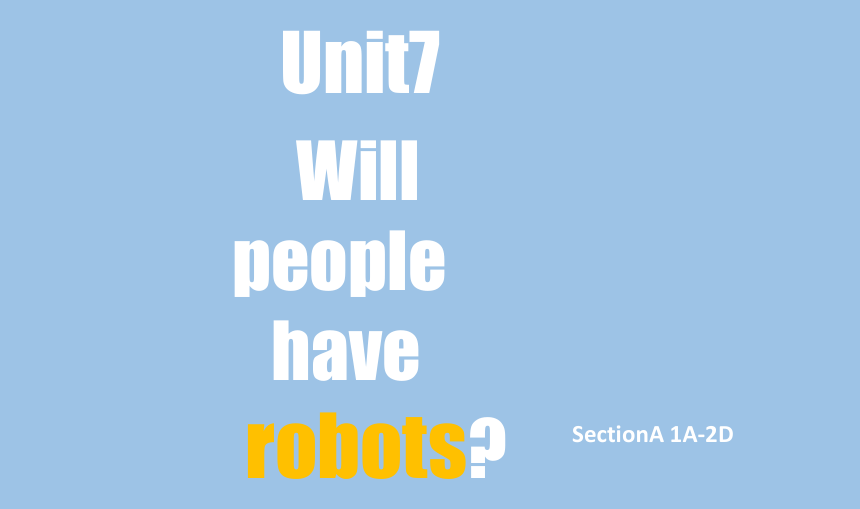 | |
| 格式 | pptx | ||
| 文件大小 | 8.3MB | ||
| 资源类型 | 教案 | ||
| 版本资源 | 人教新目标(Go for it)版 | ||
| 科目 | 英语 | ||
| 更新时间 | 2022-08-15 18:07:27 | ||
图片预览

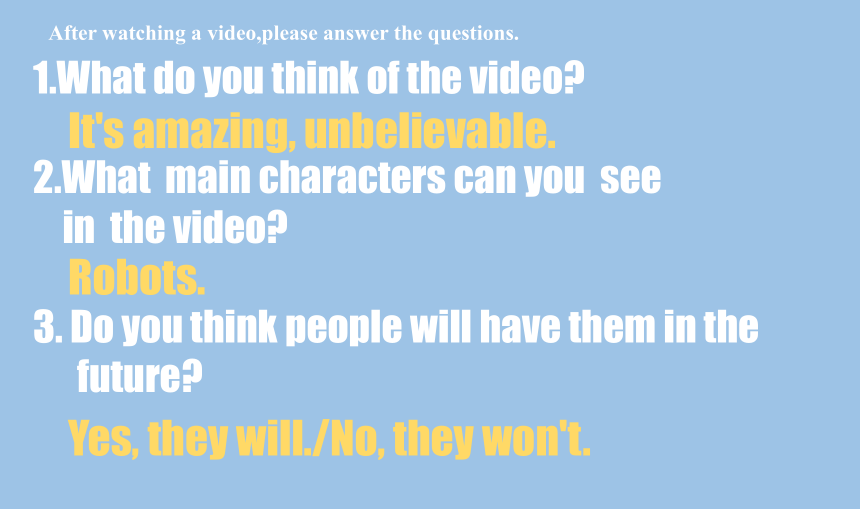
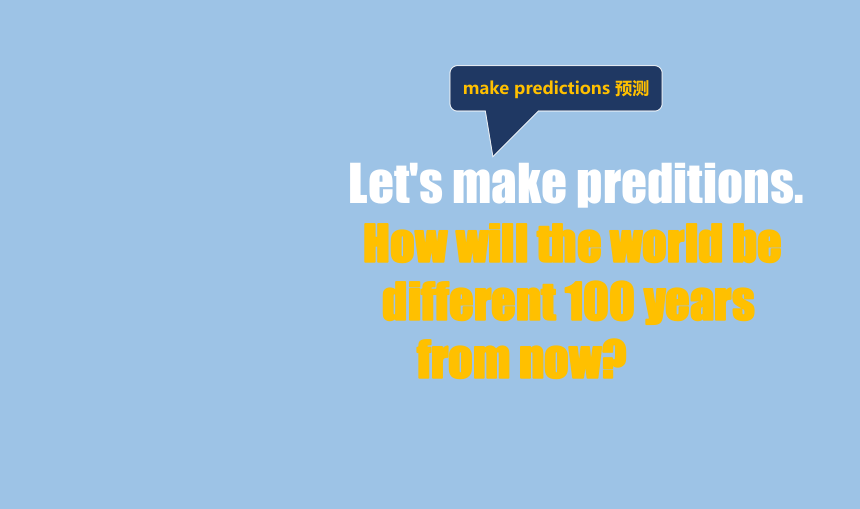
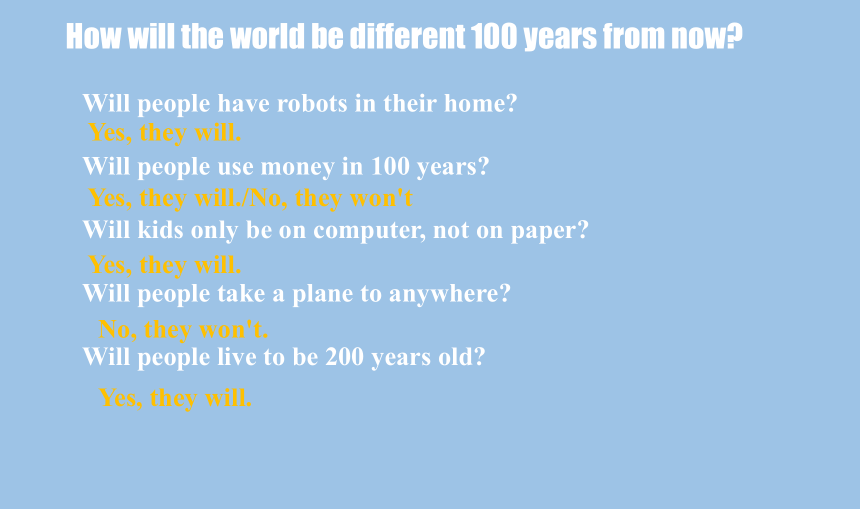
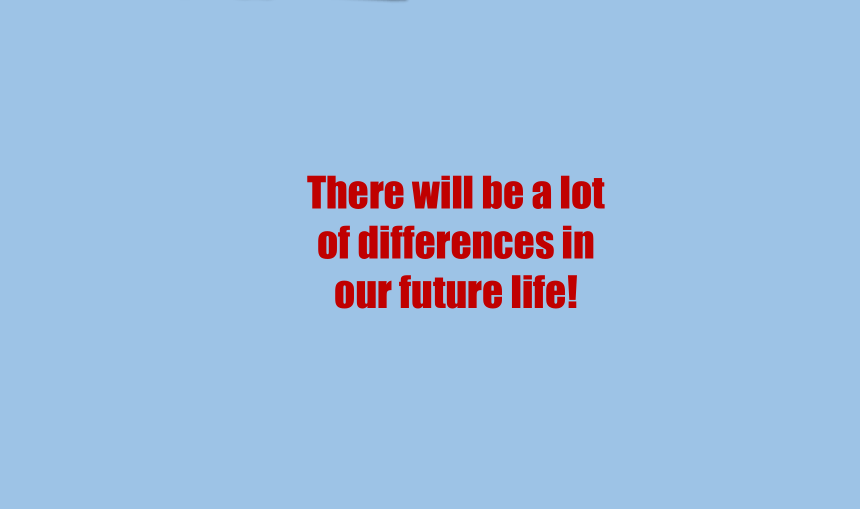
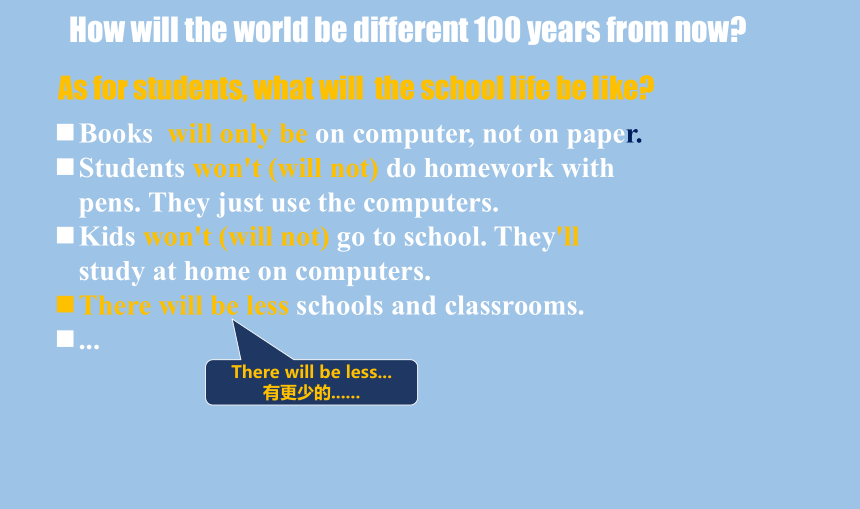
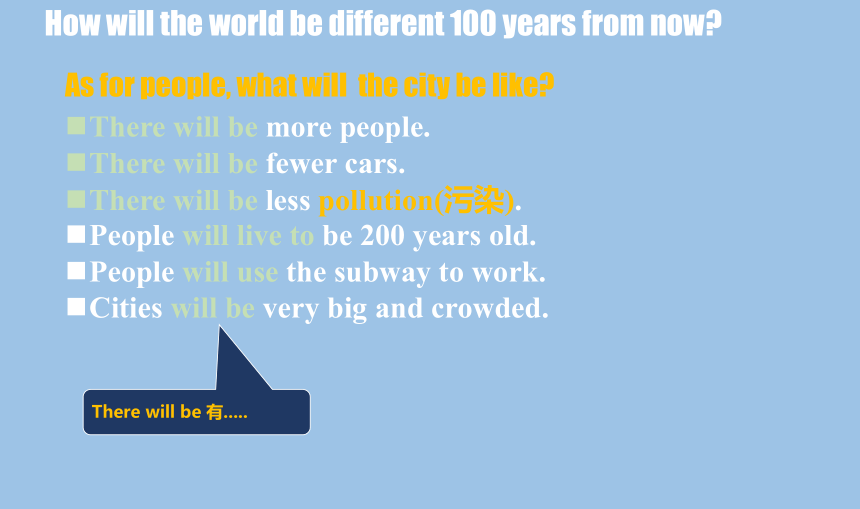
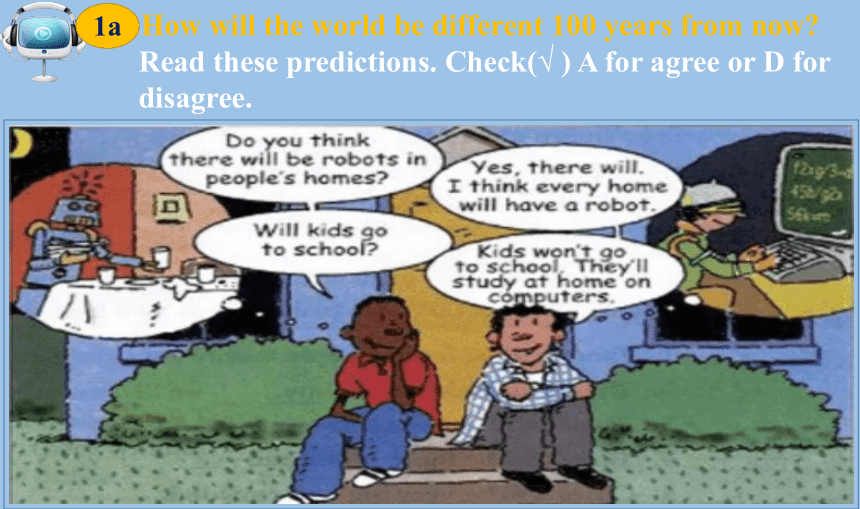
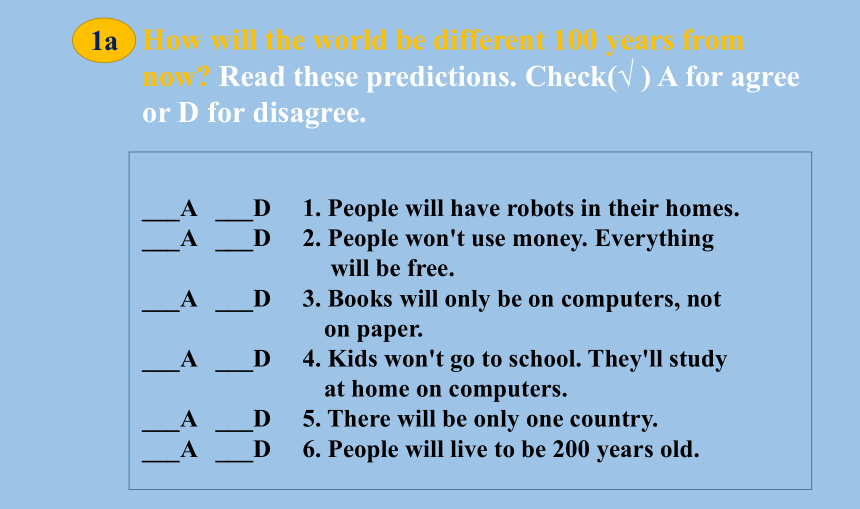
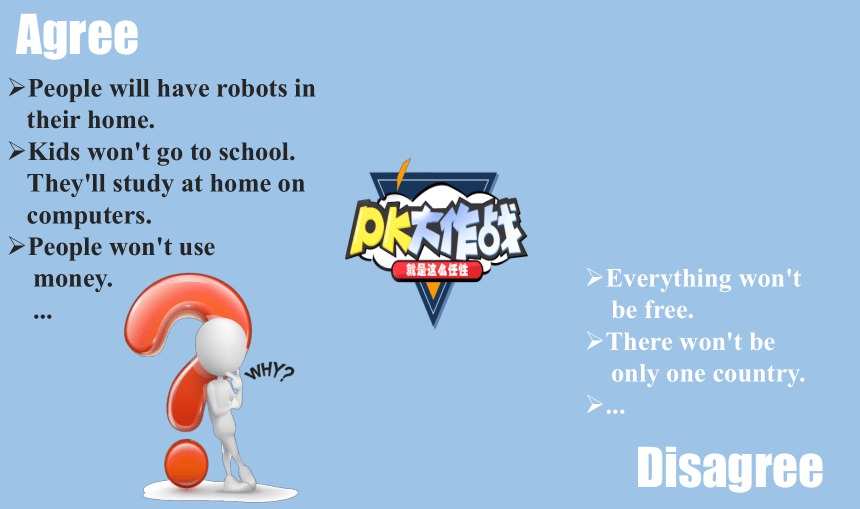
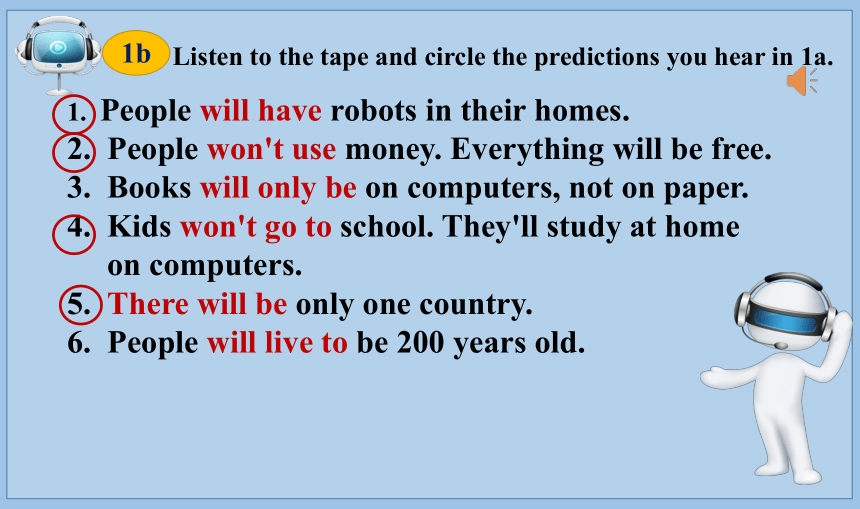
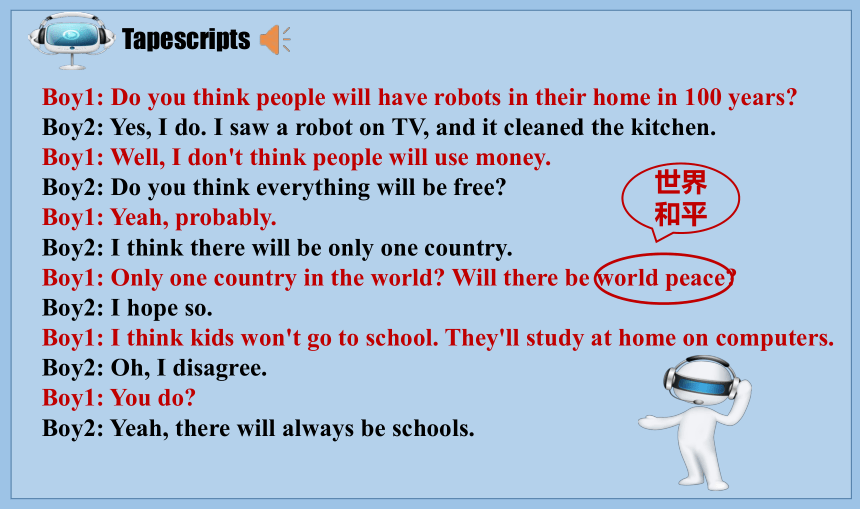
文档简介
(共47张PPT)
Will
people
have
robots
SectionA 1A-2D
Unit7
After watching a video,please answer the questions.
1.What do you think of the video
2.What main characters can you see
in the video
3. Do you think people will have them in the
future
It's amazing, unbelievable.
Robots.
Yes, they will./No, they won't.
Let's make preditions.
How will the world be
different 100 years
from now
make predictions 预测
How will the world be different 100 years from now
Will people have robots in their home
Will people use money in 100 years
Will kids only be on computer, not on paper
Will people take a plane to anywhere
Will people live to be 200 years old
Yes, they will.
Yes, they will./No, they won't
Yes, they will.
No, they won't.
Yes, they will.
There will be a lot of differences in our future life!
How will the world be different 100 years from now
As for students, what will the school life be like
Books will only be on computer, not on paper.
Students won't (will not) do homework with pens. They just use the computers.
Kids won't (will not) go to school. They'll study at home on computers.
There will be less schools and classrooms.
...
There will be less...
有更少的......
How will the world be different 100 years from now
As for people, what will the city be like
There will be more people.
There will be fewer cars.
There will be less pollution(污染).
People will live to be 200 years old.
People will use the subway to work.
Cities will be very big and crowded.
There will be 有.....
1a:How will the world be different 100 years from now
Read these predictions. Check(√ ) A for agree or D for
disagree.
1a
How will the world be different 100 years from now Read these predictions. Check(√ ) A for agree or D for disagree.
___A ___D 1. People will have robots in their homes.
___A ___D 2. People won't use money. Everything
will be free.
___A ___D 3. Books will only be on computers, not
on paper.
___A ___D 4. Kids won't go to school. They'll study
at home on computers.
___A ___D 5. There will be only one country.
___A ___D 6. People will live to be 200 years old.
1a
Agree
Disagree
People will have robots in their home.
Kids won't go to school. They'll study at home on computers.
People won't use
money.
...
Everything won't
be free.
There won't be
only one country.
...
Listen to the tape and circle the predictions you hear in 1a.
1. People will have robots in their homes.
2. People won't use money. Everything will be free.
3. Books will only be on computers, not on paper.
4. Kids won't go to school. They'll study at home
on computers.
5. There will be only one country.
6. People will live to be 200 years old.
1b
Boy1: Do you think people will have robots in their home in 100 years
Boy2: Yes, I do. I saw a robot on TV, and it cleaned the kitchen.
Boy1: Well, I don't think people will use money.
Boy2: Do you think everything will be free
Boy1: Yeah, probably.
Boy2: I think there will be only one country.
Boy1: Only one country in the world Will there be world peace
Boy2: I hope so.
Boy1: I think kids won't go to school. They'll study at home on computers.
Boy2: Oh, I disagree.
Boy1: You do
Boy2: Yeah, there will always be schools.
Tapescripts
世界和平
1. People will have robots in their homes.
2. People won't use money. Everything will be free.
3. Books will only be on computers, not on paper.
4. Kids won't go to school. They'll study at home on computers.
5. There will be only one country.
6. People will live to be 200 years old.
Grammar Focus
一般将来时
一般将来时由“助动词+动词原形”构成,表示将来某个时间要发生的
动作或存在的状态,也表示将来经常或反复发生的动作,常与表示将来
的时间状语连用,如tomorrow,next week, in the future等。例如:
We will come to see you next year.
In the future, there will be less fresh water.
Will people use money in 100 years
How will the world be different in the future?
注意:在口语中,will常常省略为‘ll, will not常省略为won't.
Post-listening
Make a conversation about the future life.
You can use the information in 1a.
A: Will people use money in 100 years
B: No, they won't. Everything will be
free. Will people live to be 200 years old
A: Yes, they will. Kids won't go to
school. They'll study at home on
computers.
B: I disagrer/I agree.
...
1c
ShowTime
We make so many predictions about our future life, like school life, cities, transportation.
Here some students also share their opinions.
I think there will be...
1. There will be (more/less/fewer) people.
2. There will be (more/less/fewer) free time.
3. There will be (more/less/fewer) cars.
4. There will be (more/less/fewer) pollution.
5. There will be (more/less/fewer) trees.
Put the words into the correct boxes:
children noise homework energy fat shop job water worker funny education teacher music
more
less
fewer
更多
更少
water
energy
noise
homework
shops jobs
workers
children
teachers
water
energy
fat
noise
homework
education
funny
music
workers
jobs
children
shops
teachers
more
less
fewer
更多
更少
water
energy
noise
homework
shops jobs
workers
children
teachers
water
energy
fat
noise
homework
education
funny
music
workers
jobs
children
shops
teachers
修饰不可数名词
修饰可数名词
more
less
fewer
更多
更少
water
energy
noise
homework
shops jobs
workers
children
teachers
water
energy
fat
noise
homework
education
funny
music
workers
jobs
children
shops
teachers
修饰不可数名词
修饰可数名词
Countable nouns Uncountable nouns
There will be more people. There will be more pollution.
There will be fewer trees. There will be less free time.
There won't be more water. There won't be more trees.
There won't be fewer cars. There won't be less fat.
1. There will be (more/less/fewer) people.
2. There will be (more/less/fewer) free time.
3. There will be (more/less/fewer) cars.
4. There will be (more/less/fewer) pollution.
5. There will be (more/less/fewer) trees.
2a:Listen and circle the words you hear.
2b:Listen again. Check the predictions you hear.
___ 1. There will be fewer people.
___ 2. There will be less free time.
___ 3. People will use the subway less.
___ 4. There will be more pollution.
___ 5. Cities will be very big and crowded.
Ms. Steen: Ok, now I want to hear everyone's predictions about future.
Girl 1: Well, I think there will be more people.
Ms. Steen: More people OK. What else
Boy1: I think that there will be less free time.
Ms. Steen: I hope not!
Girl 2: Well, I think there will be fewer cars.
Ms. Steen: You do
Girl 2: Yes, people will use the subways more.
Ms. Steen: That's a great idea. Let's hear another prediction.
Boy 2: There will be good for the earth!
Girl 1: I think there will be fewer trees. And cities will be really big and
crowded because there will be a lot more people.
1. There will be (more/less/fewer) people.
2. There will be (more/less/fewer) free time.
3. There will be (more/less/fewer) cars.
4. There will be (more/less/fewer) pollution.
5. There will be (more/less/fewer) trees.
Listening tips:
听前阅读答案找出不同;听中要适当做笔记。
考察的点是词组或意群的同义替换(less pollution替换了文本中fewer cars, subways more, good for the earth)
Tapescripts
Post-listening: Make conversations about the prediction
in 2a and 2b.
A: What will the future be like
B: I think there will be ...
A: Really I don't think so. But I think there will be ...
B: Sounds______. Will people ...
A: Yes, they will./ No, they won't.
B: Will there be world peace
A: Yes, I hope so.
2c
Everyone has his/her predictions
about future life. Now let's read
the conversation and listen to
Mike's and Jill's ideas.
Nick: What are you reading, Jill
Jill: It's a book about future.
Nick: Sounds cool. So what will the future be like
Jill: Well, cities will be more crowded and polluted. There
will be fewer trees and the environment will be in
great danger.
Nick: That sounds bad! Will we have to move to other planets
Jill: Maybe. But I want to live on the earth.
Nick: Me, too. Then what can we do
Jill: We can use less water and plant more trees. Everyone
should play a part in saving the earth.
2d: Role-play the conversation.
1. What does Jill think of the future
2. Jill and Nick want to live on the earth, what can they do
3. How should everyone save the earth Talk about your
views.
Read the conversation and answer the questions.
She thinks cities will be more crowded and polluted. There will be fewer trees and the environment will be in great danger.
They can use less water and plant more trees.
Everyone should play a part in saving the earth.
We should take more subways or buses instead of
private cars.We should recycle the paper.
...
Life in the future will become better and better.
The city won't be more crowded and polluted.
There will be more trees and the environment
will be good.
People will live to be 200 years old.
Kids won't go to school every day. They'll study home on computers.
...
Our future will be bright and wonderful!
Time for discussion
What makes a bright and wonderful future
World peace(世界和平)
the core of advanced technology (科技进步)
National cooperation(国际合作)
Resource sharing(资源共享)
Talent competition(人才竞争)
...
Watch
a
video
Study hard
Develop the advantage
After watching a video and
answer the question.
As a student,how to make our county better
Look at the starry sky,
and keep your feet on
the ground.
我们仰望星空时,更要脚踏大地。
Future Life
place
city
school
...
free time
activities
more free time
transportation
more subways
others
health
no money
...
LANGUAGE
POINT
1. Everyone should play a part in saving the
earth. 每个人都应当尽一份力来拯救地球。
play a part in doing sth是一个固定结构,表示
“参与……; 在…… 中尽自己一份力量” 例如:
She plays an active part in teaching these poor children.
她积极参加对这些贫穷孩子的教学工作。
He didn’t play a part in making this decision.
他并没有参与做出此决定。
2. People won’t use money. Everything will be free.
人们不使用钱,任何东西都是免费的。
be free 免费的, 除此意思外,be free 还有”有空的,
空闲的, 自由的”之意。
e.g. Many Spaniards believe that music and movies should be free. 许多西班牙人认为 音乐和电影应该是免费的。
Will you be free tomorrow morning
你明天早上有空吗?
I am free now. 我现在自由了。
3. Will people use money in 100 years
一百年后人们还会使用钱吗?
这里的 in 100 years “在...期间;在...以后”
后接一段时间表示在将来某段时间之后。
e.g. He'll come back in a week.
他将于一周之后回来。
I’ll call you in two hours.
我两个小时内给你打电话。
4. What’s your prediction about the future
你对未来有什么预测?
prediction 是predict 的名词形式。有“预言、预料、
预测之意。 例如:
Sales were five percent flowerer than predicted.
销售额比预计的低5%。
prediction,tion名称后缀,类似的单词还有:
pollution, protection, pronunciation, education,
nation
5. Yes, I hope so. 对,我希望如此。
此句意为Yes, I hope there will be world peace.句中的
so为副词,代替了对话中上文所说的内容, 以使得语言
简练。除hope之外,so还常与think, believe, guess等搭
配,在英语口语中非常普遍。例如:
A: Is he coming to see us 他要来看我们吗?
B: I think so. 我想是的。
Countable nouns Uncountable nouns
There will be more people. There will be more pollution.
There will be fewer trees. There will be less free time.
There won't be more water. There won't be more trees.
There won't be fewer cars. There won't be less fat.
一般将来时由“助动词+动词原形”构成,表示将来某个时间要发生的动作或存在的状态,也表示将来经常或反复发生的动作,常与表示将来的时间状语连用,如tomorrow,next week, in the future等。例如:
We will come to see you next year.
In the future, there will be less fresh water.
Will people use money in 100 years
How will the world be different in the future?
注意:在口语中,will常常省略为‘ll, will not常省略为won't.
表示“更少”less修饰不可数名词,fewer修饰可数名词复数
一般将来时
Exercise
1. —Will people live to be 300 years old
—_________.
A. No, they aren't B. No, they won't
C. No, they don't D. No, they can't
2. There will be _________ pollution this year than
last year.
A. fewer B. much C. less D. many
3. —Where is Miss Wang
—She went to Hainan Island last week and will
return(返回) _________ six days.
A. ago B. later C. behind D. in
One: Multiple chocie
B
C
D
1. 书籍将会仅仅在电脑,而不在纸上。
Books _____ only _____ on computers, not _____ paper.
2. 今后在这座城市将会有更多的树木,更少的污染。
There will _____ _____ trees and _____ pollution
in the city in future.
3. 你认为十年后你的朋友会做什么职业?
_____ do you think your friend will _____ _____ ten years
Two: Translation
will
be
on
be
more
less
What
be
in
Homework
1. Try to complete 3a in P51,
2. Draw a picture of what you
think a city in the future
will be like.
Thank you for
watching.
Will
people
have
robots
SectionA 1A-2D
Unit7
After watching a video,please answer the questions.
1.What do you think of the video
2.What main characters can you see
in the video
3. Do you think people will have them in the
future
It's amazing, unbelievable.
Robots.
Yes, they will./No, they won't.
Let's make preditions.
How will the world be
different 100 years
from now
make predictions 预测
How will the world be different 100 years from now
Will people have robots in their home
Will people use money in 100 years
Will kids only be on computer, not on paper
Will people take a plane to anywhere
Will people live to be 200 years old
Yes, they will.
Yes, they will./No, they won't
Yes, they will.
No, they won't.
Yes, they will.
There will be a lot of differences in our future life!
How will the world be different 100 years from now
As for students, what will the school life be like
Books will only be on computer, not on paper.
Students won't (will not) do homework with pens. They just use the computers.
Kids won't (will not) go to school. They'll study at home on computers.
There will be less schools and classrooms.
...
There will be less...
有更少的......
How will the world be different 100 years from now
As for people, what will the city be like
There will be more people.
There will be fewer cars.
There will be less pollution(污染).
People will live to be 200 years old.
People will use the subway to work.
Cities will be very big and crowded.
There will be 有.....
1a:How will the world be different 100 years from now
Read these predictions. Check(√ ) A for agree or D for
disagree.
1a
How will the world be different 100 years from now Read these predictions. Check(√ ) A for agree or D for disagree.
___A ___D 1. People will have robots in their homes.
___A ___D 2. People won't use money. Everything
will be free.
___A ___D 3. Books will only be on computers, not
on paper.
___A ___D 4. Kids won't go to school. They'll study
at home on computers.
___A ___D 5. There will be only one country.
___A ___D 6. People will live to be 200 years old.
1a
Agree
Disagree
People will have robots in their home.
Kids won't go to school. They'll study at home on computers.
People won't use
money.
...
Everything won't
be free.
There won't be
only one country.
...
Listen to the tape and circle the predictions you hear in 1a.
1. People will have robots in their homes.
2. People won't use money. Everything will be free.
3. Books will only be on computers, not on paper.
4. Kids won't go to school. They'll study at home
on computers.
5. There will be only one country.
6. People will live to be 200 years old.
1b
Boy1: Do you think people will have robots in their home in 100 years
Boy2: Yes, I do. I saw a robot on TV, and it cleaned the kitchen.
Boy1: Well, I don't think people will use money.
Boy2: Do you think everything will be free
Boy1: Yeah, probably.
Boy2: I think there will be only one country.
Boy1: Only one country in the world Will there be world peace
Boy2: I hope so.
Boy1: I think kids won't go to school. They'll study at home on computers.
Boy2: Oh, I disagree.
Boy1: You do
Boy2: Yeah, there will always be schools.
Tapescripts
世界和平
1. People will have robots in their homes.
2. People won't use money. Everything will be free.
3. Books will only be on computers, not on paper.
4. Kids won't go to school. They'll study at home on computers.
5. There will be only one country.
6. People will live to be 200 years old.
Grammar Focus
一般将来时
一般将来时由“助动词+动词原形”构成,表示将来某个时间要发生的
动作或存在的状态,也表示将来经常或反复发生的动作,常与表示将来
的时间状语连用,如tomorrow,next week, in the future等。例如:
We will come to see you next year.
In the future, there will be less fresh water.
Will people use money in 100 years
How will the world be different in the future?
注意:在口语中,will常常省略为‘ll, will not常省略为won't.
Post-listening
Make a conversation about the future life.
You can use the information in 1a.
A: Will people use money in 100 years
B: No, they won't. Everything will be
free. Will people live to be 200 years old
A: Yes, they will. Kids won't go to
school. They'll study at home on
computers.
B: I disagrer/I agree.
...
1c
ShowTime
We make so many predictions about our future life, like school life, cities, transportation.
Here some students also share their opinions.
I think there will be...
1. There will be (more/less/fewer) people.
2. There will be (more/less/fewer) free time.
3. There will be (more/less/fewer) cars.
4. There will be (more/less/fewer) pollution.
5. There will be (more/less/fewer) trees.
Put the words into the correct boxes:
children noise homework energy fat shop job water worker funny education teacher music
more
less
fewer
更多
更少
water
energy
noise
homework
shops jobs
workers
children
teachers
water
energy
fat
noise
homework
education
funny
music
workers
jobs
children
shops
teachers
more
less
fewer
更多
更少
water
energy
noise
homework
shops jobs
workers
children
teachers
water
energy
fat
noise
homework
education
funny
music
workers
jobs
children
shops
teachers
修饰不可数名词
修饰可数名词
more
less
fewer
更多
更少
water
energy
noise
homework
shops jobs
workers
children
teachers
water
energy
fat
noise
homework
education
funny
music
workers
jobs
children
shops
teachers
修饰不可数名词
修饰可数名词
Countable nouns Uncountable nouns
There will be more people. There will be more pollution.
There will be fewer trees. There will be less free time.
There won't be more water. There won't be more trees.
There won't be fewer cars. There won't be less fat.
1. There will be (more/less/fewer) people.
2. There will be (more/less/fewer) free time.
3. There will be (more/less/fewer) cars.
4. There will be (more/less/fewer) pollution.
5. There will be (more/less/fewer) trees.
2a:Listen and circle the words you hear.
2b:Listen again. Check the predictions you hear.
___ 1. There will be fewer people.
___ 2. There will be less free time.
___ 3. People will use the subway less.
___ 4. There will be more pollution.
___ 5. Cities will be very big and crowded.
Ms. Steen: Ok, now I want to hear everyone's predictions about future.
Girl 1: Well, I think there will be more people.
Ms. Steen: More people OK. What else
Boy1: I think that there will be less free time.
Ms. Steen: I hope not!
Girl 2: Well, I think there will be fewer cars.
Ms. Steen: You do
Girl 2: Yes, people will use the subways more.
Ms. Steen: That's a great idea. Let's hear another prediction.
Boy 2: There will be good for the earth!
Girl 1: I think there will be fewer trees. And cities will be really big and
crowded because there will be a lot more people.
1. There will be (more/less/fewer) people.
2. There will be (more/less/fewer) free time.
3. There will be (more/less/fewer) cars.
4. There will be (more/less/fewer) pollution.
5. There will be (more/less/fewer) trees.
Listening tips:
听前阅读答案找出不同;听中要适当做笔记。
考察的点是词组或意群的同义替换(less pollution替换了文本中fewer cars, subways more, good for the earth)
Tapescripts
Post-listening: Make conversations about the prediction
in 2a and 2b.
A: What will the future be like
B: I think there will be ...
A: Really I don't think so. But I think there will be ...
B: Sounds______. Will people ...
A: Yes, they will./ No, they won't.
B: Will there be world peace
A: Yes, I hope so.
2c
Everyone has his/her predictions
about future life. Now let's read
the conversation and listen to
Mike's and Jill's ideas.
Nick: What are you reading, Jill
Jill: It's a book about future.
Nick: Sounds cool. So what will the future be like
Jill: Well, cities will be more crowded and polluted. There
will be fewer trees and the environment will be in
great danger.
Nick: That sounds bad! Will we have to move to other planets
Jill: Maybe. But I want to live on the earth.
Nick: Me, too. Then what can we do
Jill: We can use less water and plant more trees. Everyone
should play a part in saving the earth.
2d: Role-play the conversation.
1. What does Jill think of the future
2. Jill and Nick want to live on the earth, what can they do
3. How should everyone save the earth Talk about your
views.
Read the conversation and answer the questions.
She thinks cities will be more crowded and polluted. There will be fewer trees and the environment will be in great danger.
They can use less water and plant more trees.
Everyone should play a part in saving the earth.
We should take more subways or buses instead of
private cars.We should recycle the paper.
...
Life in the future will become better and better.
The city won't be more crowded and polluted.
There will be more trees and the environment
will be good.
People will live to be 200 years old.
Kids won't go to school every day. They'll study home on computers.
...
Our future will be bright and wonderful!
Time for discussion
What makes a bright and wonderful future
World peace(世界和平)
the core of advanced technology (科技进步)
National cooperation(国际合作)
Resource sharing(资源共享)
Talent competition(人才竞争)
...
Watch
a
video
Study hard
Develop the advantage
After watching a video and
answer the question.
As a student,how to make our county better
Look at the starry sky,
and keep your feet on
the ground.
我们仰望星空时,更要脚踏大地。
Future Life
place
city
school
...
free time
activities
more free time
transportation
more subways
others
health
no money
...
LANGUAGE
POINT
1. Everyone should play a part in saving the
earth. 每个人都应当尽一份力来拯救地球。
play a part in doing sth是一个固定结构,表示
“参与……; 在…… 中尽自己一份力量” 例如:
She plays an active part in teaching these poor children.
她积极参加对这些贫穷孩子的教学工作。
He didn’t play a part in making this decision.
他并没有参与做出此决定。
2. People won’t use money. Everything will be free.
人们不使用钱,任何东西都是免费的。
be free 免费的, 除此意思外,be free 还有”有空的,
空闲的, 自由的”之意。
e.g. Many Spaniards believe that music and movies should be free. 许多西班牙人认为 音乐和电影应该是免费的。
Will you be free tomorrow morning
你明天早上有空吗?
I am free now. 我现在自由了。
3. Will people use money in 100 years
一百年后人们还会使用钱吗?
这里的 in 100 years “在...期间;在...以后”
后接一段时间表示在将来某段时间之后。
e.g. He'll come back in a week.
他将于一周之后回来。
I’ll call you in two hours.
我两个小时内给你打电话。
4. What’s your prediction about the future
你对未来有什么预测?
prediction 是predict 的名词形式。有“预言、预料、
预测之意。 例如:
Sales were five percent flowerer than predicted.
销售额比预计的低5%。
prediction,tion名称后缀,类似的单词还有:
pollution, protection, pronunciation, education,
nation
5. Yes, I hope so. 对,我希望如此。
此句意为Yes, I hope there will be world peace.句中的
so为副词,代替了对话中上文所说的内容, 以使得语言
简练。除hope之外,so还常与think, believe, guess等搭
配,在英语口语中非常普遍。例如:
A: Is he coming to see us 他要来看我们吗?
B: I think so. 我想是的。
Countable nouns Uncountable nouns
There will be more people. There will be more pollution.
There will be fewer trees. There will be less free time.
There won't be more water. There won't be more trees.
There won't be fewer cars. There won't be less fat.
一般将来时由“助动词+动词原形”构成,表示将来某个时间要发生的动作或存在的状态,也表示将来经常或反复发生的动作,常与表示将来的时间状语连用,如tomorrow,next week, in the future等。例如:
We will come to see you next year.
In the future, there will be less fresh water.
Will people use money in 100 years
How will the world be different in the future?
注意:在口语中,will常常省略为‘ll, will not常省略为won't.
表示“更少”less修饰不可数名词,fewer修饰可数名词复数
一般将来时
Exercise
1. —Will people live to be 300 years old
—_________.
A. No, they aren't B. No, they won't
C. No, they don't D. No, they can't
2. There will be _________ pollution this year than
last year.
A. fewer B. much C. less D. many
3. —Where is Miss Wang
—She went to Hainan Island last week and will
return(返回) _________ six days.
A. ago B. later C. behind D. in
One: Multiple chocie
B
C
D
1. 书籍将会仅仅在电脑,而不在纸上。
Books _____ only _____ on computers, not _____ paper.
2. 今后在这座城市将会有更多的树木,更少的污染。
There will _____ _____ trees and _____ pollution
in the city in future.
3. 你认为十年后你的朋友会做什么职业?
_____ do you think your friend will _____ _____ ten years
Two: Translation
will
be
on
be
more
less
What
be
in
Homework
1. Try to complete 3a in P51,
2. Draw a picture of what you
think a city in the future
will be like.
Thank you for
watching.
同课章节目录
- Unit 1 Where did you go on vacation?
- Section A
- Section B
- Unit 2 How often do you exercise?
- Section A
- Section B
- Unit 3 I'm more outgoing than my sister.
- Section A
- Section B
- Unit 4 What's the best movie theater?
- Section A
- Section B
- Unit 5 Do you want to watch a game show?
- Section A
- Section B
- Unit 6 I'm going to study computer science.
- Section A
- Section B
- Unit 7 Will people have robots?
- Section A
- Section B
- Unit 8 How do you make a banana milk shake?
- Section A
- Section B
- Unit 9 Can you come to my party?
- Section A
- Section B
- Unit 10 If you go to the party, you'll have a grea
- Section A
- Section B
